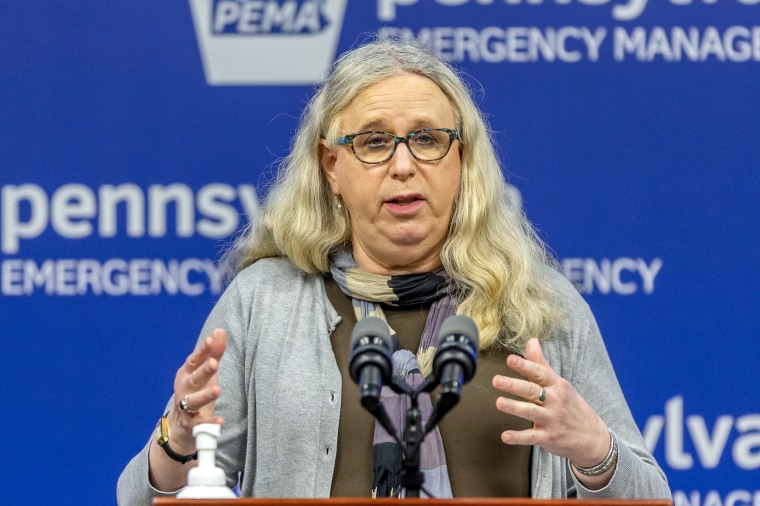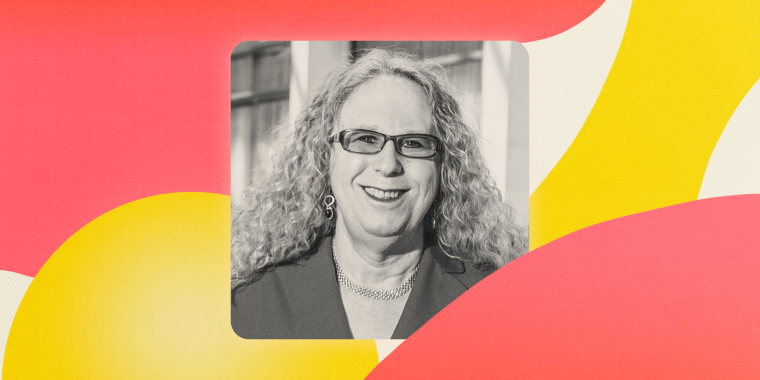[June is Pride Month, and this year we're celebrating by honoring 30 LGBTQ firsts. To see the full list, visit nbcnews.com/pride30.]
Dr. Rachel Levine is no stranger to being a trailblazer. She became one of the country's highest-ranking openly transgender officials in 2015, when Pennsylvania's Republican-majority Senate confirmed her as the state's physician general. Three years later, she became the country's most prominent transgender public health official when she was confirmed as the state health secretary.
In March, Levine, 63, rose even higher, becoming the first Senate-confirmed transgender federal official in the country's history. She was confirmed in a 52-48 vote to be the assistant secretary for health at the Department of Health and Human Services.
Recalling a line from Vice President Kamala Harris' victory speech in November — "While I may be the first woman in this office, I will not be the last" — Levine said she is similarly confident that her achievement will open doors for future generations of transgender American leaders.
"I will not be the last transgender individual that's appointed to a Senate-confirmed position," Levine said.
In Levine's new role, LGBTQ youths have been at the forefront of her mind, she said, as dozens of bills targeting transgender youths have been introduced in statehouses across the country — a reality that she said was "unfortunate and disturbing."
"These are vulnerable youth who have suffered bullying and harassment, and we need to protect them and advocate for them not to have discriminatory laws passed against them," she said.
The bills are also one of the factors behind a mental health crisis that has proliferated among LGBTQ youths during the coronavirus pandemic, according to a recent survey by the Trevor Project, an organization focused on suicide prevention and crisis intervention for LGBTQ youths. The survey found that 42 percent of LGBTQ youths seriously considered attempting suicide in the past year — including more than half of transgender and nonbinary youths — and that 94 percent of LGBTQ youths reported that recent politics negatively affected their mental health.
The support President Joe Biden promised to transgender youths in his first joint address to Congress in April, Levine said, is backed up by her own, which she plans to show through external advocacy for LGBTQ youths and internal policy work at Health and Human Services.
"What I want to say is that I have your back, too," she said.
Some of that internal work will occur through Levine's position as co-chair of Health and Human Services' new Behavioral Health Coordinating Council, which will determine how the department tackles mental health and substance abuse issues. The creation of the council — which will meet three times a year beginning in the early summer — comes alongside the department's allocation of $3 billion from the American Rescue Plan to states and territories for mental health and substance abuse prevention and treatment programs.
Trained at Harvard College, Tulane University School of Medicine and Mount Sinai Medical Center, Levine has long advocated for young and marginalized patients in her care. She was a professor of pediatrics and psychiatry at the Penn State College of Medicine, and during her time at Penn State Hershey Medical Center, she developed multidisciplinary programs for adolescent physical and mental health and launched an initiative to combat eating disorders among the state's youths.

As physician general of Pennsylvania, she tackled the state's opioid crisis by signing what amounted to a statewide prescription authorizing pharmacies to dispense the lifesaving overdose drug naloxone to anyone who asked for it in 2015. Less than a year later, she said, the drug had saved nearly 1,000 lives in the state.
Last year, as Covid-19 surged, Levine led Pennsylvania's public health response, earning praise in local news media as a "calm and reassuring" communicator during daily briefings. Now, as the country emerges from the pandemic, Levine wants to combat vaccine hesitancy — particularly among LGBTQ people, who "are more likely to experience stigma and medical mistrust that may impact COVID-19 vaccine acceptance," according to a study published this year in the journal Vaccines, which also found that Black LGBTQ people were "significantly less likely to accept a COVID-19 vaccine."
For Levine, reaching those historically marginalized communities is crucial, as is rebuilding trust between LGBTQ people and the medical community and collecting more complete Covid-19 data that incorporate sexual orientation and gender identity information to provide more targeted treatment.
"We know that the LGBTQ community has suffered discrimination in medical care, and so it's so important to address that both for Covid-19 and generally," she said.
Those are among the concerns Levine will bring to Health and Human Services' Health Disparities Council, which she co-chairs and which met with for the first time in May. The group, which meets every other month, is responsible for advising Health and Human Services on reducing racial and ethnic health disparities. In addition to LGBTQ youths and people of color, LGBTQ seniors and immigrants also need to be centered in federal health policymaking, Levine said.
"We are making progress, but to make true progress, we have to protect those most vulnerable in our community," she said. "We have to make progress for all of us."
Part of that progress, Levine hopes, will come as a result of Health and Human Services' recently announced reinterpretation of the Affordable Care Act and Title IX's prohibitions on sex-based discrimination to include discrimination on the basis of both sexual orientation and gender identity.
"That will have significant ramifications across the health care system because of how important the Affordable Care Act is," Levine said. "We need to make sure that gets implemented throughout [Health and Human Services] and the health care sector."
Despite her rise to one of the country's top roles in public health, Levine remains a target of transphobic attacks. Most recently, Donald Trump Jr. posted a meme comparing Levine's appearance to that of California gubernatorial candidate Caitlyn Jenner, who was condemned for re-sharing the image. And after President Joe Biden nominated Levine to be assistant secretary in January, she faced a transphobic smear campaign from other figures on the right.
Levine said she sees such attacks as the product of fear — and as all the more reason to share her story.
"You can see that people fear what they have not experienced and what they don't understand," she said. "What I want to do is educate people about LGBTQ and transgender individuals, using me and my story as an example."
For Levine, Pride Month offers 30 days' worth of opportunities.
"Pride is so wonderful. It's so affirming. Pride has always been so empowering, that we can all stand up as a community and be proud of who we are," she said. "For me, I will be talking about it all month."
